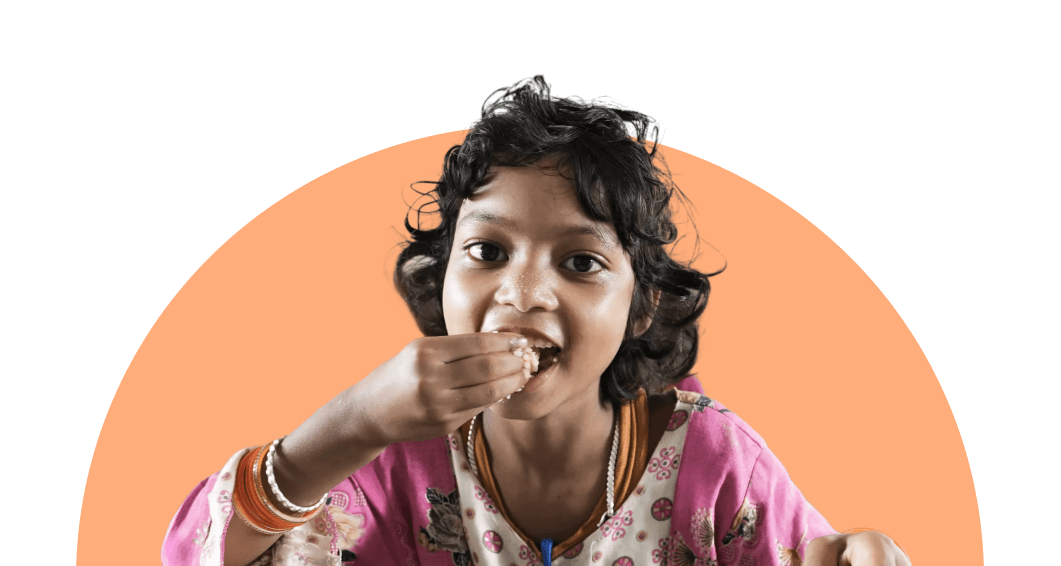Eid-ul-Fitr

Celebrate with Charity and Compassion
Eid-ul-Fitr is one of the most joyous occasions in the Islamic calendar. It marks the end of the holy month of Ramadan. This month of fasting, prayer and reflection is concluded with this celebration and a spirit of gratitude and compassion. For Muslims, Eid-ul-Fitr is a time to thank Allah (SWT) for granting them the strength to complete Ramadan and to share happiness with others.
At Charity Meals, we believe that no one should have to suffer from hunger or malnutrition, and that belief is only strengthened at Eid-ul-Fitr. The essence of Eid aligns perfectly with our mission to provide hunger relief and help build resilient communities around the world.
What Is Eid-ul-Fitr?
Eid-ul-Fitr, often simply called Eid, is celebrated on the first day of Shawwal, the month that follows Ramadan in the Islamic lunar calendar. It begins with the sighting of the new moon, symbolising renewal, forgiveness and spiritual growth.
When asked about the importance of Eid, the Prophet Muhammad (SAW) said:
“Verily Allah has replaced them for you with something better than them: the days of Eid al-Adha and of Eid al-Fitr.”
— [Sahih Sunan Abi Dawood]
How Do You Celebrate Eid-ul-Fitr?
The Eid-ul-Fitr festival begins with glorifying Allah (SWT) by reciting the Takbeer:
“Allahu Akbar, Allahu Akbar, la ilaha ill-Allah, wa Allahu Akbar, Allahu Akbar, wa Lillah il-hamd.”
(Allah is the Greatest, there is no god but Allah and to Allah belongs all praise.)
Muslims then perform the Eid prayer (Salah al-Eid) in congregation, followed by heartfelt duas (supplications) for forgiveness and blessings. Families come together, visit loved ones, exchange greetings and share meals in a spirit of joy and gratitude.
Before attending the Eid prayer, believers are encouraged to bathe (ghusl), dress in their best clothes and eat something sweet, usually dates, following the Sunnah of the Prophet (SAW).
Another beloved Sunnah is to take a different route home after the prayer, symbolising renewal and spreading blessings wherever one goes.
Sunnah and Acts of Worship on Eid
Eid is both a festival and an act of worship. Observing its Sunnah strengthens faith and reminds us of the Prophet’s (PBUH) beautiful example. Among the recommended acts are:
Performing Ghusl: Cleansing oneself before going out for the prayer.
Eating Before Salah: The Prophet (PBUH) would eat an odd number of dates before leaving.
Reciting Takbeer: Praising Allah (SWT) openly from home to the prayer place.
Exchanging good wishes: The companions used to congratulate each other on the completion of fasting and Ramadan prayers on the day of Eid-ul-Fitr.
Wearing One’s Best Clothes: The Prophet (SAW) wore a special cloak on Eid, which should inspire us to appear in our best attire.
Taking a Different Route Home: as narrated in Bukhari 986, this can be a beautiful symbolic gesture of gratitude and renewal.
Paying Zakat-ul-Fitr: A vital act of charity before the Eid prayer, ensuring that everyone, especially the poor, can celebrate Eid with dignity.
The Meaning of Eid-ul-Fitr Duas
On this blessed day, Muslims are encouraged to make Eid-ul-Fitr duas. These are prayers of thanks, forgiveness and compassion. The Prophet’s companions would say to one another:
“Taqabbal Allahu minna wa minkum” – “May Allah accept (good deeds) from us and from you.”
This heartfelt supplication captures the true spirit of Eid. That is a spirit of humility, unity and a desire for collective blessings.
When is Eid-ul-Fitr 2026 in the UK?
The exact date of Eid-ul-Fitr 2026 in the UK depends on the sighting of the new moon, which marks the end of Ramadan. Based on astronomical calculations, Ramadan is expected to begin around 17 February 2026, meaning Eid-ul-Fitr is likely to fall on the night of 19 March 2026.
In the UK, the celebration of Eid-ul-Fitr brings communities of all backgrounds together. Mosques hold special prayers, families share home-cooked meals and children receive gifts and Eidi (Eid money).
But amidst the celebrations, it is also a time to remember those who are struggling. This means the poor and the hungry, who cannot otherwise share in the feast.
Giving Zakat and Charity This Eid
Before the prayer of Eid, Muslims are obligated to give Zakat-ul-Fitr. This charitable act purifies the fast and ensures that everyone can partake in the celebrations. For those unable to distribute it personally, donating through trusted organisations like Charity Meals ensures it reaches the most vulnerable in time.
Once you’ve calculated your amount, you can Give Your Zakat through Charity Meals safely and easily.
At Charity Meals, we go beyond Zakat-ul-Fitr. Our mission is rooted in the belief that no one should suffer from hunger, dehydration, starvation, or malnutrition. Your donations directly support emergency food relief and long-term food security projects.
By donating your Zakat, Sadaqah, or a simple Eid gift, you help feed families who have nothing to break their fasts with. Your compassion turns the meaning of Eid – mercy, gratitude, and generosity – into lasting change.
Share the Joy of Eid-ul-Fitr
The Eid-ul-Fitr festival is a celebration of faith, family and giving. As you prepare to celebrate Eid-ul-Fitr 2026 in the UK, remember that your generosity can bring hope to families around the world who are facing hunger and despair.
Donate your Zakat-ul-Fitr to Charity Meals and let your blessings reach those who need them most. Together, we can ensure that the joy of Eid is felt in every home and in every heart.
Eid Mubarak from all of us at Charity Meals: May your Eid be filled with peace, prosperity, and compassion. May Allah (SWT) accept your fasts, prayers and good deeds.
Donate a Hot Meal Today!
Join us on our mission to relieve hunger across the globe and bring the joy of food to those
who need it most.
